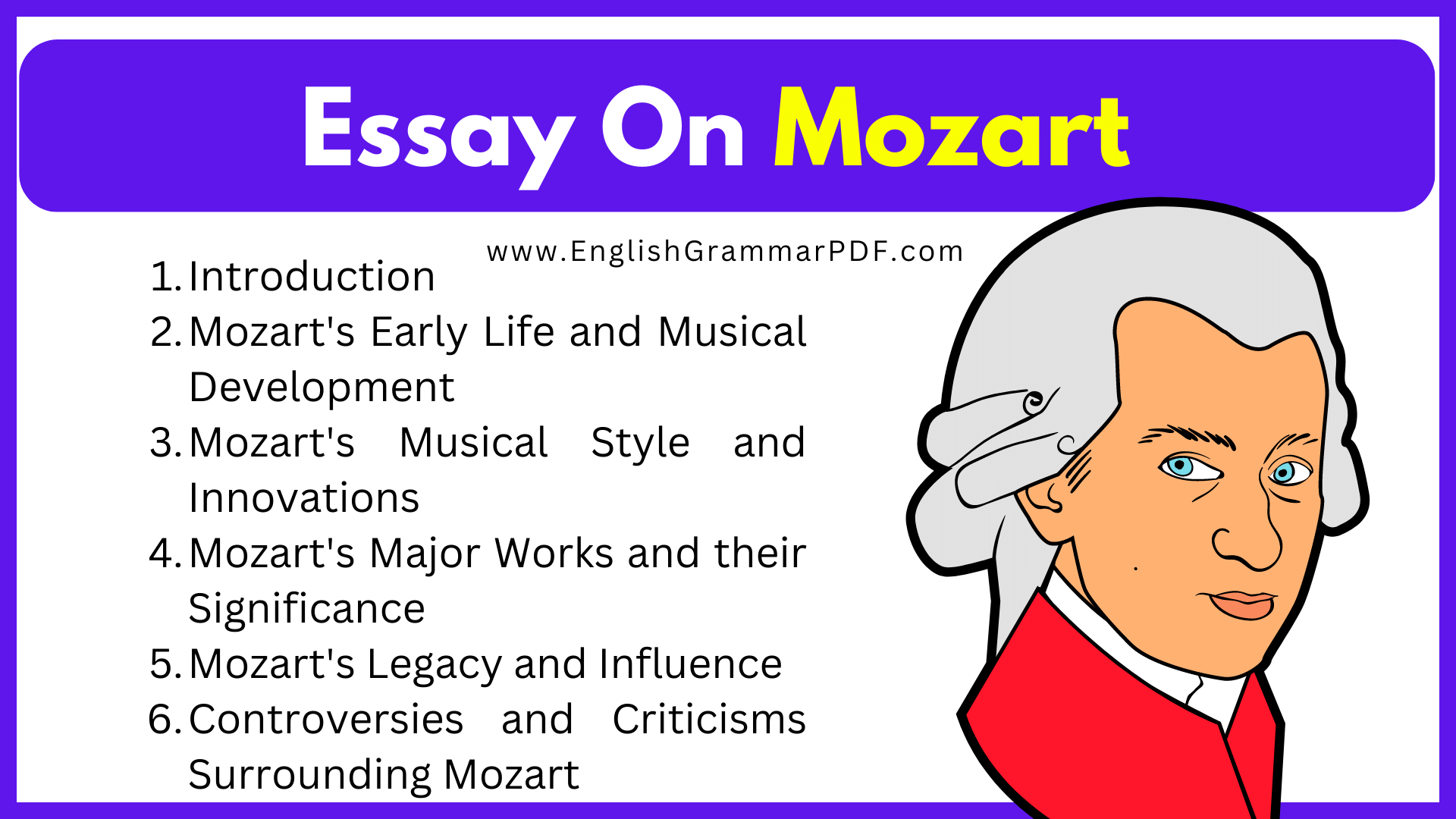Essay On Mozart
Outline of Essay:
- Introduction
- Mozart’s Early Life and Musical Development
- Mozart’s Musical Style and Innovations
- Mozart’s Major Works and their Significance
- Mozart’s Legacy and Influence
- Controversies and Criticisms Surrounding Mozart
Introduction
Wolfgang Amadeus Mozart is one of the most renowned and influential composers in the history of Western classical music. His compositions continue to captivate audiences and inspire musicians across the globe. Mozart’s music is characterized by its elegance, emotional depth, and technical mastery, making him a significant figure in the development of classical music.
Mozart’s Early Life and Musical Development
Born in Salzburg, Austria, in 1756, Mozart displayed exceptional musical talent from a young age. He came from a musical family, with his father, Leopold Mozart, being a respected composer and violinist. Mozart’s childhood was dedicated to music, and he began composing at the tender age of five. His early compositions already showed remarkable skill and creativity, setting the stage for his future success. Under his father’s guidance, Mozart received a comprehensive musical education, honing his skills as a composer and performer.
Mozart’s Musical Style and Innovations
Mozart’s musical style and innovations mark him as a true pioneer in the world of classical music. His compositions exhibit a unique blend of elegance, emotional depth, and technical brilliance that set him apart from his contemporaries. Mozart’s ability to create music that was both technically sophisticated and emotionally resonant remains unmatched.
One of the key aspects of Mozart’s musical style is his impeccable craftsmanship. His compositions exhibit meticulous attention to detail, with every note and phrase carefully placed for maximum impact. Mozart was a master of form, seamlessly crafting intricate musical structures that captivate listeners. Whether it was a symphony, opera, or chamber music, Mozart demonstrated an innate understanding of musical architecture and an ability to create balanced and cohesive works.
Mozart’s melodic genius is another hallmark of his style. His melodies are characterized by their elegance, beauty, and memorability. Mozart had a gift for creating melodic lines that effortlessly flow and enchant the listener. His melodies often soar and dance, evoking a wide range of emotions from joy and serenity to melancholy and longing. These melodies, combined with his expert use of phrasing and dynamics, create a profound emotional impact on the listener.
Mozart’s Major Works and their Significance
Mozart’s major works span a wide range of genres and demonstrate his extraordinary versatility as a composer. From his operas to symphonies, chamber music, and piano sonatas, each composition showcases Mozart’s exceptional skill, musicality, and profound understanding of the human experience.
Mozart’s operas, such as “The Marriage of Figaro,” “Don Giovanni,” and “The Magic Flute,” are considered masterpieces of the genre. These works revolutionized opera by combining engaging storytelling with sublime music. Mozart’s ability to create complex characters, convey their emotions through music, and seamlessly integrate drama and comedy into his compositions revolutionized the operatic form. His operas remain popular and are regularly performed in opera houses worldwide, captivating audiences with their timeless beauty and emotional depth.
In the realm of symphonies, Mozart’s contributions are equally significant. His symphonies, including the iconic “Symphony No. 40” and “Symphony No. 41” (also known as the “Jupiter Symphony”), exemplify the pinnacle of classical symphonic writing. Mozart expanded the symphonic form, pushing its boundaries and elevating it to new heights of expression and complexity. His symphonies are characterized by their brilliant orchestration, intricate counterpoint, and inventive use of form and structure. They laid the foundation for future composers and continue to be studied and performed by orchestras worldwide.
Mozart’s chamber music and piano sonatas also hold a special place in his body of work. His chamber music compositions, such as the “String Quartets” and “Piano Trios,” demonstrate his ability to create intimate and collaborative musical conversations. These works showcase his deep understanding of each instrument’s capabilities and his mastery in weaving together individual voices into a harmonious whole.
Mozart’s Legacy and Influence
Mozart’s influence on subsequent composers and musical movements cannot be overstated. His innovations in form, melody, and harmony set the stage for the development of the classical style. Composers such as Beethoven, Haydn, and Schubert were deeply inspired by Mozart’s music and built upon his ideas. Mozart’s works continue to be performed and cherished by musicians and audiences worldwide, attesting to his lasting impact on classical music.
Controversies and Criticisms Surrounding Mozart
While Mozart is widely celebrated, he was not immune to criticism during his lifetime. Some contemporaries found fault with his unconventional compositions and questioned his ability to adhere to traditional musical conventions. In modern times, scholars and critics have engaged in debates regarding the quality and depth of Mozart’s music, raising questions about his originality and emotional depth. Additionally, controversies surrounding Mozart’s personal life, including his financial struggles and unconventional relationships, have sparked discussions about the intersection of art and biography.
FAQ’s
What is so special about Mozart?
Mozart’s music is revered for its timeless beauty, emotional depth, and technical brilliance. His compositions demonstrate a profound understanding of musical structure and an ability to evoke a wide range of emotions, making him one of the most revered composers in history.
Why is Mozart good for the brain?
Listening to Mozart’s music has been associated with various cognitive benefits. The complex and intricate nature of his compositions can stimulate brain activity, enhance spatial-temporal reasoning, and improve focus and concentration. This phenomenon, known as the “Mozart effect,” has been studied in the context of cognitive development and learning.
Explore More Essays:
Download the PDF of Essay






